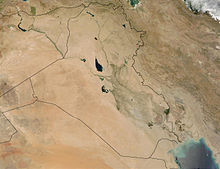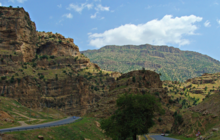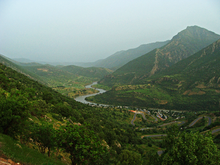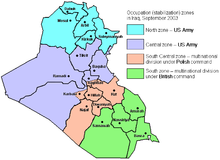Iraq
Template:Infobox State/Maintenance/TRANSCRIPTION
Template:Infobox State/Maintenance/NAME-German
The Republic of Iraq (official: Arabic جمهورية العراق, DMG Ǧumhūriyyat al-ʿIrāq, Kurdish كۆماری عێراق Komarî Êraq), in short Iraq or (internationally) also Iraq, is a state in the Near East. Bordered by Kuwait, Saudi Arabia, Jordan, Syria, Turkey, Iran, and the Persian Gulf, Iraq encompasses most of the "Mesopotamia" between the Euphrates and Tigris rivers, where the earliest advanced civilizations of the Near East originated, as well as parts of the adjacent desert and mountain regions. It is counted among the Mashreq states. The north of the country is formed by the autonomous region of Kurdistan, which has its own parliament and armed forces (Peshmerga).
With about 38 million inhabitants, Iraq is one of the five largest countries in the Arab world. Its capital and largest city is the metropolis of Baghdad, other cities with millions of inhabitants are also Basra, Mosul, Erbil, Sulaymaniyah, Najaf, Kirkuk and Karbala. Due to refugee movements in the 20th and 21st centuries, rapid urbanization took place in the country. Iraq ranks fourth in the world list of countries with the most natural resources, its economy is based mainly on the export of oil and to a lesser extent on agriculture.
Today's Iraq was formed in 1920 from the three Ottoman provinces of Baghdad, Mosul and Basra. From 1921 to 1958 the Kingdom of Iraq existed, in 1958 the king was overthrown by a military coup and the republic was proclaimed. From 1979 to 2003, the country was ruled dictatorially by Saddam Hussein, and the country waged wars against neighboring Iran and Kuwait. A multinational invasion force ("Coalition of the Willing") led by the United States overthrew Saddam Hussein's regime in 2003 without establishing stable structures for the post-war era.
After the declared end of the war, civil war-like conditions, thousands of terrorist attacks, acts of war and violent crime, both by different Iraqi groups against each other and against the Western occupation forces, occurred during the occupation of Iraq in 2003-2011. They claimed an unknown number of lives and injuries, especially among Iraqi civilians. In June 2014, ISIS militants captured parts of Iraqi territory as part of the 2014 Iraq Crisis. In December 2017, the Iraqi government announced that Iraqi forces had taken full control of the Syrian-Iraqi border and that the war against IS had ended.
The country has also been considered unstable since the fighting ended, with nationwide protests beginning in October 2019.
Geography
Iraq belongs to the Orient. The cultural area of the Orient usually includes countries of North Africa and Southwest Asia. They are predominantly located in the subtropical dry belt of the "Old World".
In the northeast there is a mountain range about 3000 m high, consisting of the foothills of the Taurus Mountains and the Zagros'. This range is part of the alpine mountain range that extends eastwards from the Balkan Mountains into Turkey, northern Iraq and Iran and then on to Afghanistan. The highest mountain is the Cheekha Dar with 3611 m height.
National borders
Iraq borders Iran (1458 km common border), Kuwait (240 km), Saudi Arabia (814 km), Jordan (181 km), Syria (605 km) and Turkey (352 km). With the exception of the border with Iran, which formed the eastern border of the Ottoman Empire until 1918, the course of Iraq's border was determined by the colonial powers. The Neutral Zone between Saudi Arabia and Iraq was divided between the two countries in 1975-1983. In addition, Iraq has a 58.3 km long coastal strip. The north of the country is formed by the Autonomous Region of Kurdistan, which has established a de facto border within the country.
See also: Border between Iraq and Syria and Border between Iraq and Turkey
Climate
The north of Iraq, up to about the latitude of Baghdad, lies in winter in the area of the so-called west wind zone of the temperate latitudes and in summer under the influence of high pressure with temperatures between -6 °C in winter and 51 °C in midsummer (annual average 22 °C). The area south of Baghdad, on the other hand, belongs to the subtropical high pressure belt all year round. Summers are rainless throughout the country and, with the exception of the mountainous regions, quite warm with average temperatures around 33 to 34 °C. Sometimes strong, year-round winds from the northwest mean that the cities of Baghdad and Basra, for example, are hit by dust storms on about 20 and 15 days a year respectively.
Temperatures vary between 50 °C in summer and around zero in January. Frost is possible, especially in the mountains. Rain falls about 10 to 18 cm a year, main rain months are December to April. The areas bordering the Gulf are somewhat wetter.
Rivers and lakes
Iraq is crossed by two important rivers, the Euphrates and the Tigris. This was reflected in the geographical name Mesopotamia, which translated means the "(land) between the two rivers". The Euphrates and Tigris come from the northwest from Syria and Turkey, respectively, and cross the country to the southeast. At al-Qurna in the south of Iraq, the Tigris and Euphrates converge. There they form the 193 kilometre long Shatt al-Arab/Arvandrud, which flows into the Persian Gulf. The Euphrates and Tigris were and are the lifelines of the country, providing water for much of Iraq's agriculture and population. In the southeast of the country, the Faw Peninsula juts into the Persian Gulf between Iran and Kuwait, providing Iraq's only access to the sea.
West of Baghdad there are three depressions into which water from the Euphrates and Tigris can be channelled during floods: Lake Tharthar, Lake al-Habbaniyya and Lake Razzaza.
The marshlands in southern Iraq, the so-called Ahwar, were systematically drained during the First Gulf War in the 1980s. With international aid, the Iraqi government has been trying to irrigate these areas again since 2003.
flora and fauna
As there are different precipitation conditions in Iraq, there are also different types of vegetation. In northern Iraq there is shrub vegetation and isolated forest stands. On the banks of the Euphrates and Tigris rivers there are date palms and reed beds. The south, on the other hand, is sparsely vegetated. Government projects to turn the desert areas into fertile soils were abandoned in the 1980s.
Various species of birds such as vultures, buzzards, ravens and owls are native to Iraq, as well as mammals such as caracals, hyenas, jackals, gazelles and antelopes live in Iraq. The Tigris, Euphrates and Shatt al-Arab rivers are also home to an abundance of fish. Until the beginning of the 19th century there were lions and ostriches in Iraq.

Satellite image with marked national borders

Zagros Mountains in northeastern Iraq

Landscape in Northern Iraq at the Great Zab
History
→ Main article: History of Iraq
Antiquity to Modern Times: From Mesopotamia to the Ottoman Empire
Iraq lies on the territory of ancient Mesopotamia (DMG Bayn an-Nahrayn = Arab. "between the two rivers"); some of the earliest advanced civilizations of mankind (Sumer, Akkad, Assyria, Babylonia, Mittani, Media) emerged here from the 4th millennium B.C. onwards, which is why the region is seen by many today as the cradle of civilization.
After the Battle of Kadesia in 636, the Arab Muslims seized the territory. Iraq became an important cultural center of the spreading Islam. In 762 Baghdad was founded by al-Mansur as the capital of the Abbasid Caliphate and soon developed into the most important city of the Islamic world. The following period is also referred to as the golden age of Islam, in which science and the arts in particular developed to a significantly higher level than in Europe, for example.
In 1401 Baghdad was devastated by Timur, and in 1534 the country fell to the Ottoman Empire. Iraq long remained an insignificant sideshow; however, its geostrategic position on the intersecting routes between Europe, British India, Central Asia, the Caucasus, and southern Arabia made it an object of world political interest from World War I onward. During World War I (on November 6, 1914, the day after war was declared on the Ottoman Empire), British troops and Arab insurgents invaded together and occupied Baghdad in 1917.
Modern Iraq from 1920
In 1920, Britain carved out the vilâyets of Baghdad, Mosul and Basra from the former Ottoman Empire and merged them into what is now Iraq. The Iraqi uprising of 1920 was bloodily put down. The League of Nations retroactively gave Britain a mandate over Iraq in 1922. Thus, the British Mandate of Mesopotamia was established. On August 23, 1921, Faisal, son of Sheriff Hussein of Mecca, was proclaimed king. The Kingdom of Iraq was admitted to the League of Nations on October 3, 1932.
The main oil activities in the country were concentrated in the Iraq Petroleum Company, which emerged from the Turkish Petroleum Company in 1929, paid only small concession fees and was wholly owned by foreign companies.
Second World War and foiled coup d'état
At the outbreak of World War II, the Iraqi government under Nuri as-Said severed diplomatic relations with Germany and adopted a pro-British stance in foreign policy that had no support in army circles and among broad sections of the population. On April 1, 1941, the army staged a coup and brought the anti-British politician Rashid Ali al-Gailani to the head of the government, who proclaimed Iraq's neutrality and demanded the withdrawal of all British soldiers. On May 2, 1941, military clashes began between British and Iraqi troops that lasted a month and ended in Iraqi defeat.
With British support, Nuri as-Said again took over the government in October 1941. Britain's political, economic and military influence as a former mandate power in Iraq, secured by treaty, was permanently restored until the Baghdad Pact in the mid-1950s. On January 16, 1943, Iraq declared war on the fascist Axis powers.
Independence 1958
→ Main article: Coup d'état in Iraq 1958
In response to the creation of the United Arab Republic, on February 14, 1958, the two Hashemite kingdoms of Iraq and Jordan declared their union into a British-backed Arab Federation. Under General Abdel Karim Qasim, the so-called "Free Officers" banded together to throw off British control. They overthrew and assassinated the pro-British monarch (Faisal II 1935-1958) on July 14, 1958. On July 15, the federation with Jordan was dissolved and the Republic of Iraq was proclaimed. Hundreds of thousands of Iraqis poured into the streets to celebrate ath-Thawra (the revolution).
With the proclamation of the republic, new political conditions were created. The monarchy was abolished and Iraq withdrew from the CENTO (Baghdad) Pact concluded with Turkey, Pakistan and Iran. The right of women to vote and stand for election was provided for in the constitutional amendment of 26 March 1958, which was passed by the Parliament of the Kingdom of Iraq. However, the regime then in power was overthrown in the summer of 1958 before elections with female participation could take place. Women's suffrage, which led to actual voting, was not introduced until February 1980. The last British soldiers left the country on 24 March 1959.
Baath Party coup in 1963
The small Iraqi Ba'ath Party, with the help of conspirators in the Iraqi army, staged a coup against Qasim on February 8, 1963. Weakened by internal infighting, the Ba'ath Party was overthrown a few months later in the military coup of November 18, 1963, by President Abd as-Sallam Arif. Under his brother Abd ar-Rahman, Iraq severed diplomatic relations with the United States in 1967. After a second coup on July 17, 1968, the Ba'ath Party regained power, Ahmad Hasan al-Bakr became president and chairman of the Revolutionary Command Council (RCC), and Saddam Hussein became vice president and deputy chairman of the RCC.
In the spring of 1969, fighting broke out again between government troops and the Kurds, who had been fighting the central government since 1961. It is true that Saddam Hussein and the Kurdish leader Mustafa Barzani signed a peace treaty in March 1970, which guaranteed the Kurds political autonomy. However, fighting continued until April 1975, when Iraq signed the Algiers Agreement with neighboring Iran to redraw the border at the Shatt al-Arab. Iran then ended its aid to the Kurds, leading to their surrender.
Time since the second coup of the Baath Party; Hussein's assumption of power in 1979; wars 1980-1991
When the Baath Party was in power, mass executions and arbitrary arrests followed, especially of communist and other left-leaning intellectuals. Especially after Saddam Hussein came to power following the resignation of al-Bakr on 16 July 1979, there were massive human rights violations, to which many Baathists also fell victim.
After months of conflict with Iran, Hussein ordered the Iraqi army on 22 September 1980 to attack the neighbouring country with a total of nine out of twelve divisions. After initial successes, the Iraqi army had to withdraw further and further from 1982 onwards and finally had to wage war in its own country from 1984 onwards. This First Gulf War lasted until 1988 and cost an estimated 250,000 Iraqis their lives. In this war, the state also used chemical warfare agents several times against both the Iranians and its own population.
After a failed assassination attempt on Saddam Hussein, 600 residents of the small town of Dujail were arrested on July 17, 1982, and 148 of them were executed. In 1988, the regime launched the so-called Anfal operation, in which, according to estimates, up to 180,000 Iraqi Kurds were murdered.
On August 2, 1990, the Iraqi army invaded and occupied Kuwait. It was only through the intervention of international forces led by the United States that the country was liberated in February 1991 during the Second Gulf War. The U.S. leadership used the incubator lie to mobilize its policies, partners, and population. As a result of the occupation, the United Nations imposed sanctions on the country, which led to international isolation and, through the mismanagement of permitted trade goods, to the impoverishment of large segments of the population.
1991 Suppression of the Shiite uprising, genocide: 60,000-100,000 dead (according to other estimates up to 300,000 dead). In 1991, the Shiites had dared to revolt against the regime, first in southern Iraq and then in other regions, after an international coalition led by the USA had driven the Iraqi troops out of Kuwait. At the time, government forces did not just end the uprising by military means. They also spread terror by arbitrarily rounding up and executing civilians in Shia towns. The mass graves from this period were only discovered after the fall of the regime in 2003.
Iraq War 2003, removal of Hussein and occupation until 2011
→ Main article: Occupation of Iraq 2003-2011
On March 20, 2003, the Iraq War began with air strikes on the capital Baghdad. In May 2003, US President Bush declared major combat operations over and Iraq was divided into occupation zones with the approval of the UN Security Council. On May 22, 2003, the UN Security Council unanimously passed Resolution 1483 to this effect, which regulated the role of the UN and the occupying powers after the war.
Following the formation of a Transitional Council at the end of 2003, the administrative mandate exercised until then by the Coalition Interim Administration was transferred to a representative Iraqi Interim Government on 28 June 2004. Iraq has been politically in a state of transition ever since: after this Third Gulf War, the former power structures, in particular the Revolutionary Command Council, are no longer in place, but the new relationships, at that time between the Western occupation, the civilian administration and the Iraqi Governing Council, had not been definitively established.
On October 15, 2006, al-Qaida in Iraq proclaimed an Islamic state that would encompass a total of six provinces.
Al-Qaeda in Iraq apparently pursued the strategy of provoking a civil war between Shiites and Sunnis in order to prevent Iraq from finding a state order. Death squads targeted followers of the opposing religious group. Since 2003, the Jordanian Abu Musab az-Zarqawi (killed by US units on June 7, 2006) was considered the most important head of the Iraqi organization Ansar al-Islam. The US accused Iran and Syria of doing nothing to stop the infiltration of foreign fighters. Terrorist attacks waged by Sunnis and Shiites against each other, but above all the direct and indirect consequences of the American occupation, claimed between 100,000 and 1,000,000 lives by 2008, depending on the study.
On 30 June 2009, American combat troops left the cities and handed over their bases and other facilities to Iraqi forces. In August 2010, the last U.S. combat troops left the country; since then, 50,000 trainers and military advisers remained in the country. Their withdrawal was completed on 18 December 2011.
The second parliamentary elections since the new constitution came into force took place on 7 March 2010. The strongest force was the Iyad Allawi-led Iraqiya with 91 seats, ahead of the State of Law coalition of incumbent Prime Minister Nuri al-Maliki, which won 89 seats. The National Iraqi Alliance became the third strongest force in parliament with 70 seats.
Insurgency and war against IS 2011-2017
→ Main article: Insurgency in Iraq (after US withdrawal).
![]()
This article or section needs revision. More details should be given on the discussion page. Please help improve it, and then remove this tag.
Even after the withdrawal of US troops, the situation in the country remained tense. The civil war in neighbouring Syria also had an impact in Iraq. In 2012 and 2013, there were demonstrations against the al-Maliki government in the provinces inhabited mainly by the Sunni minority. At the same time, attacks on civilians increased.
Starting in 2014, parts of Iraq, such as the city of Mosul, were occupied by the terrorist organization Islamic State in Iraq and the Levant. Since the "Islamic State" (IS) began its advance in the northwest of the country in August 2014, 3.2 million people have been displaced. Many have taken shelter with host families, while others live in camps or in basements and backyards. The Tikrit massacre was also carried out by this terrorist cell during this period.
In the ensuing war against IS, the Iraqi armed forces and the People's Mobilization Forces (alHashd ash-Shaʿbī), supported by an international alliance, succeeded in pushing back the so-called Islamic State. The battle for Mosul ended in June 2017 with the recapture of the city. In December 2017, Iraqi Prime Minister Haidar al-Abadi announced victory over the IS.
In 2014, there were extensive missions in Iraq by the Association of the National Committees of the Blue Shield (ANCBS), based in The Hague, to protect cultural assets (museums, archives, archaeological sites, monuments, etc.) threatened by war and theft. This has included work on "no-strike lists" to protect cultural property in the event of air strikes.
Current situation since 2018
In August 2019, Israeli forces apparently attacked several targets in Iraq attributed to the Shiite militias that had borne the brunt of the fight against IS with the Iraqi army in the previous three years. US officials confirmed that Israel was responsible for at least one drone strike on Iraqi territory. The US was subsequently held partly responsible for Israel's actions by a faction in the Iraqi parliament, which called on the roughly 5,000 US troops remaining in the country, who had also come to Iraq in 2014 to fight IS, to leave immediately.
In January 2020, the Iraqi parliament voted for the complete withdrawal of all US troops from its own country. The background to this is the targeted killing of the Iranian general Qasem Soleimani in Baghdad.

Occupation zones of Iraq by the USA (blue and purple), Great Britain (green) and Poland (light red) in September 2003
Questions and Answers
Q: Where is Iraq located?
A: Iraq is located in southwestern Asia.
Q: Which countries does Iraq share its borders with?
A: Iraq shares its borders with Saudi Arabia, Kuwait, Turkey, Syria, Jordan, and Iran.
Q: What is the capital of Iraq?
A: The capital of Iraq is Baghdad.
Q: What does the Greek name Mesopotamia mean?
A: The Greek name Mesopotamia means "Land between the rivers".
Q: Why is the region between the Euphrates and Tigris rivers often referred to as the cradle of civilization and the birthplace of writing?
A: The region between the Euphrates and Tigris rivers is often referred to as the cradle of civilization and the birthplace of writing because it has been home to continuous successive civilizations since the 6th millennium BC.
Q: What empires was Iraq part of?
A: Iraq was part of several empires, including Safavid and Afsharid.
Q: Which group of people make up the north's population in Iraq?
A: Ethnic Kurds make up the north's population a majority.
Search within the encyclopedia